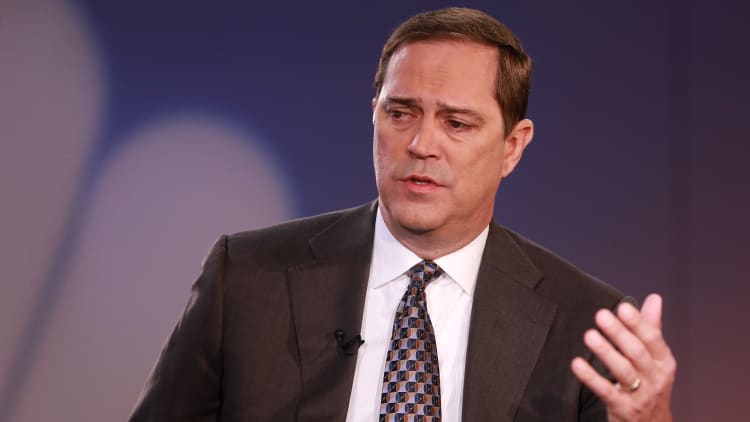Cisco CEO Chuck Robbins has been traveling so much of late that he could be forgiven if he appeared jetlagged on Monday as the company officially named him chairman of the board.
Robbins is just back from China, where he spoke at the World Internet Conference alongside Apple CEO Tim Cook and Google CEO Sundar Pichai. Robbins said it's somewhere between his 16th and 18th trip to China in the past five years.
His frequent travel across the Pacific Ocean is indicative of an evolving relationship between Cisco and the world's second-largest economy. China has long presented a challenge to U.S. technology companies, due to the country's rigid control over internet content and its favorable treatment of domestic vendors.
In 2013, Cisco was among a number of large American companies essentially blacklisted by China after the revelations from National Security Agency contractor Edward Snowden that the U.S. was spying on foreign governments.
"We have seen gradual improvements over there over the last couple years," Robbins told CNBC on Monday, before taking the stage at the annual shareholders meeting in San Jose, California. "There are no shortcuts in China. You have to invest the time there and you have to build the relationships there and understand the market."
Robbins, a Cisco veteran of two decades, was head of global sales until mid-2015, when he succeeded John Chambers as CEO. Chambers held the role of chairman until Monday.
Robbins has overseen a rally in the stock of late. The shares have jumped 26 percent in the past four months to $37.96, the highest since 2001 and the dot-com crash.
While Robbins has stoked investor excitement by building the company's subscription software business, in part through acquisitions, and notching key partnerships with the likes of Google, Cisco has been shrinking for two years. And for fiscal 2018, analysts are only projecting sales growth of about 1 percent, according to Thomson Reuters.
But Robbins doesn't want you to see Cisco as a legacy enterprise tech company sitting on a mountain of cash ($71.6 billion as of October). Rather, for an indication of Cisco's place in the future, he'll tell you to look at places like China.
Cisco, which became one of the world's biggest businesses by selling switches and routers that direct internet traffic, is providing the infrastructure for so-called smart cities. In addition to speaking at the World Internet Conference, Robbins was in China last week for the groundbreaking of the country's second smart city, this one in Huizhou in the Guangdong province.
New integrated traffic and parking systems, connected lighting and a future of autonomous driving are all part of the vision for these new cities that are being developed in China, India, Saudi Arabia and elsewhere.
'Greenfield cities'
"These are literally greenfield cities that are being built," Robbins said. Cisco is the "backbone and infrastructure provider, all the way up through the data management layer," he said.
In his many trips to China, Robbins said he's realized that relationships there are built on the provincial level, working with government and business leaders on the ground.
"The provinces are, in many cases, like countries," he said.

As promising as these new cities may be for Cisco to test networking technologies and erect large infrastructure projects, Robbins has to deal with the very real threat the changing computing landscape poses to his company's core business.
It's no secret that companies are moving data and workloads out of their own data centers and into the cloud. Amazon Web Services is hosting an increasing amount of this data, but so are Microsoft and Google. That all adds up to fewer companies buying big Cisco boxes.
Cisco is looking for ways to not only play in the cloud but to have a central role in its growth. Robbins sees security technology as one major place for Cisco to win business — protecting data across mobile devices, various clouds, traditional data centers and a host of new microservices.
He's also forging partnerships. In October, Cisco signed a deal with Google that will combine Google's data center and software expertise with Cisco's global salesforce and security. The idea for Cisco is to help its customers migrate to the cloud and navigate multiple clouds before businesses find other vendors to do it for them.
It was a marquee announcement for Cisco and got investors wondering if similar deals may be coming with other cloud providers.
Robbins isn't ready to announce anything, but when asked on Monday if we can assume more such tie-ups are in the works, he offered a two-word reply: "That's fair."
WATCH: When Cisco jumps over 5 percent in one day



